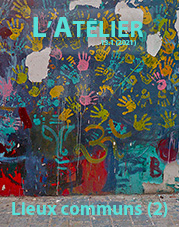“The delicate threads of romance”: American Affective Community and Romance in the Work of Chimamanda Ngozi Adichie
Abstract
This paper focuses on the influence of romance on Chimamanda Ngozi Adichie's novel Americanah (2013) and short story collection The Thing Around Your Neck (2009). We posit that it is the common nature of the genre as a hypothetical foundation for a feminine and popular culture which allows Adichie to interrogate the fractures of American society at the beginning of the twenty-first century. In several ways, the author reexamines romance as a "commonplace" and questions the limits of the union it implies. First, she probes the ability of this fictional genre to repair the cracks in the American national community through the portrayal of interracial love affairs that do not transcend social hierarchies. She challenges the "feminine" commonality that would naturally emerge from the text, in a relationship of irenic concord and pleasure transmitted to an ideal reader. By insisting on the disunions and misunderstandings of the relationships she depicts, the disjunction between Ifemelu's experience and the romantic matrix in which it is inscribed, she also examines "commonplaces" understood as banalities, those which suggest that love is blind or that one should love one’s country. By treating these clichés in a literal way, she endows them with a polemical charge. What happens to a passion that truly suffers from blindness? What if the country to which we devote our affection does not love us in return?
Keywords : romance, feminism, affect, marriage, immigration, race, nation, gender
Downloads
Published
Issue
Section
License
- Work submitted for publication must be original, previously unpublished, and not under consideration for publication elsewhere. If previously published figures, tables, or parts of text are to be included, the copyright-holder's permission must have been obtained prior to submission.
- Authors of accepted manuscripts will assign to L'Atelier the right to electronically distribute their article, or publish it in any form (Internet, CD ROM, printed copy) but authors will retain copyright and, after the article has appeared in L'Atelier, authors may republish their text (in print and/or electronic form) as long as they clearly acknowledge L'Atelier as the original publisher.


